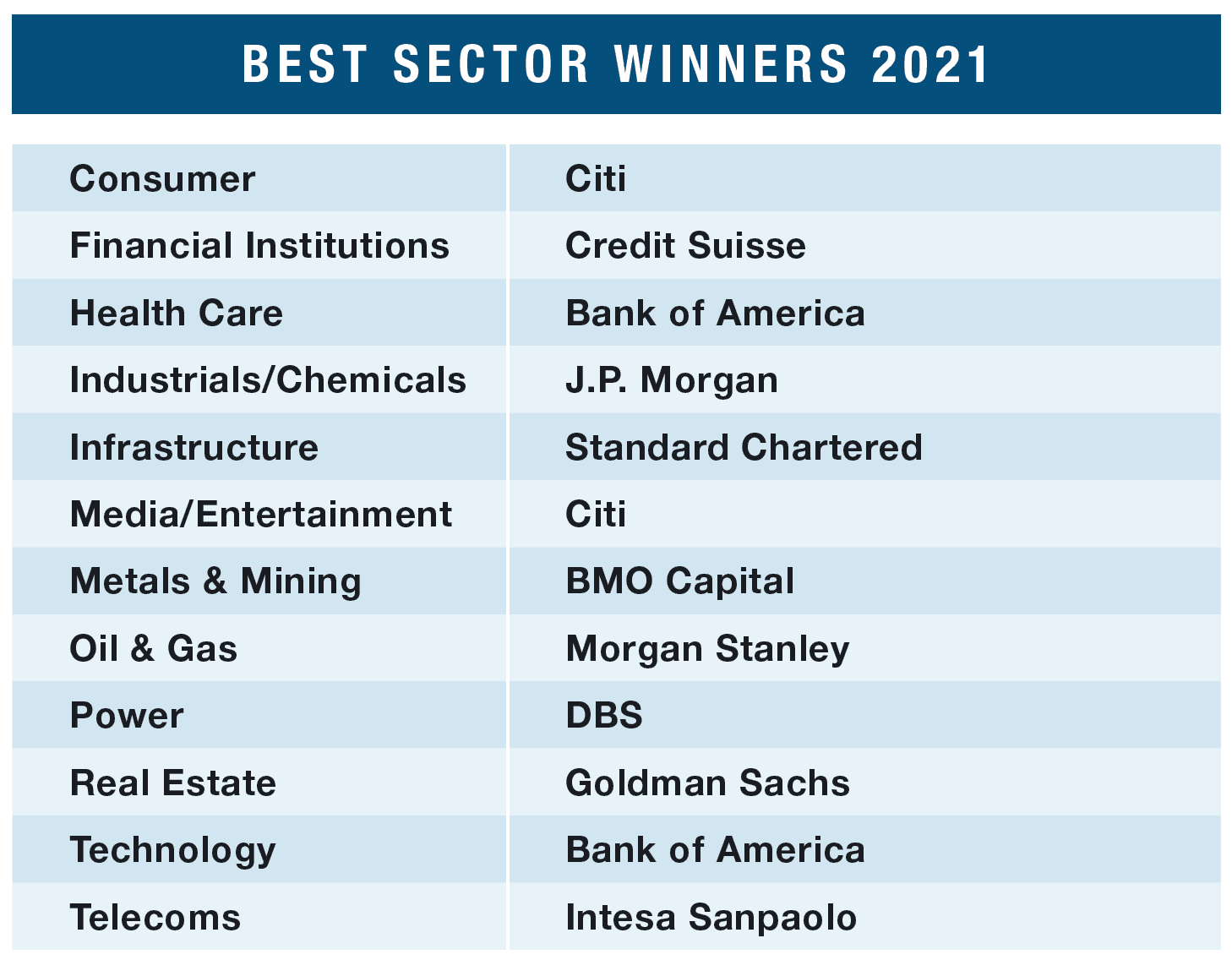Our leading investment banks benefited from outperformance in sectors that profited from Covid’s disruptions.

Last year, in the shadow of Covid-19, global investment banking was charged with helping companies persevere through a period of extraordinarily slow economic growth, lockdowns and closed borders. Even so, net revenue for investment banking increased about 20% to $93.2 billion in 2020, from $78 billion in 2019, according to Dealogic.
Driving this growth were industries that found a silver lining in the disruption and social distancing, including online media/entertainment, e-commerce, financial services, health care, industrials/chemicals and technology; while the oil and gas, power and real estate sectors suffered declines. Global Finance’s sector awards for investment banks, given to 10 banks in 12 different sectors, recognize each bank’s exceptional service in a specific industry.
Maintaining and growing a specialized international practice requires teams with extensive sector knowledge and deep relationships with industry participants—and for some sectors, government and regulatory bodies. The institutions named in this year’s awards used their experience and knowledge to achieve results for clients with innovative and practical solutions in a singularly difficult time.
Companies in the media/entertainment sector experienced significant revenue losses, leading to an uptick both in bond and equity offerings and in mergers and acquisitions (M&A). As a result, global investment banking net revenue grew 27% in 2020 to $5.3 billion. Citi took the title in this sector, capturing 5.2% of the market on $270.6 million in net revenue.
In-person businesses that shut down to comply with pandemic restrictions worked to stay out of bankruptcy. The many that succeeded were able to do so because capital markets provided liquidity to fund their business and equity to reset their balance sheets, says Daniel Richards, managing director and co-head of the Global Media and Communications Group at Citi. Other media and entertainment companies accelerated the strategic pivot to online services.
Relatedly, some industry segments experienced increased demand from consumers at home. Entertainment companies, including video game providers, evolved into a core communications tool beyond just provision of pastimes, Richards says. “It’s a way for those platforms to be more than what they originally were, because the consumer is spending so much time on that device or using that platform.”
On the M&A side, companies experiencing disruption found themselves considering paths to new growth.
“Many media companies were not in a position to do M&A, as the focus was more on liquidity and funding,” says Aly Alibhai, managing director of M&A at Citi. “But that will evolve as we emerge from this pandemic; once they’re on stronger footing, we’re likely to see more activity.”
Credit Suisse, this year’s winner in the financial institutions sector, captured 6.2% of the market with $1.3 billion in net revenue. Increased market uncertainty and volatility created significant liquidity concerns for the sector; rising interest rates and declining consumer spending and travel impacted consumer, mortgage and small-business lending, and wealth management for financial institutions. Commission-free trades and de-SPAC activity—the purchase of a private operating company by a publicly-traded SPAC—have influenced equity valuations as well.
“Banks with consumer exposure saw share prices down by about 30% at the trough,” says Alejandro Przygoda, global head of Credit Suisse’s Financial Institutions Group. “Financial technology was less impacted, as the market believed that financial institutions would become more dependent on technology and/or benefit by increased trading volume volatility.”
Credit Suisse helped financial institutions raise capital and liquidity that ultimately helped markets to reopen. Notable deals by the bank included the Aon merger with Willis Towers Watson for an implied combined equity value of $80 billion; Schwab’s acquisitions of Ameritrade for $22 billion and USAA’s wealth management business for $1.6 billion; S&P Global’s acquisition of IHS Markit for $44 billion; and initial public offerings for SelectQuote, Rocket and MediaAlpha.
Consolidation within the health care industry was one of last year’s dramatic developments as health systems looked to create synergies and economies of scale, streamline services, coordinate care and create market share for negotiating contracts. Net revenue for investment banks grew a record 41% to $12.3 billion in 2020. Bank of America, this year’s winner for the health care sector, captured 8% market share with $982 million in net revenue. Notable deals it advised on last year included the $39 billion sale of Alexion Pharma to AstraZeneca and the $21 billion sale of Immunomedics to Gilead Sciences.
BMO Capital emerged as the winner in the metals and mining sector for the 12th straight year. Despite the economic slowdown, fundamentals for precious metals remained strong through the pandemic.
“Gold prices set new records,” says Ilan Bahar, co-head of the Global Metals and Mining Group at BMO, “fueled primarily by the economic uncertainty of Covid-19, reallocation to gold by macro asset allocators—including ETF inflows—and negative real yields.”
Base metals have exhibited signs of a strong cycle tied to the global economic recovery. “Virtually every base metal price has performed extremely well, and we are starting to see share price levels and valuations exceed those we have seen for a number of years,” says Bahar. As governments extend incentives for electric vehicles, demand for metals that are strategic to the shift to electrification is forecast to grow substantially from current levels; some analysts expect higher government debt and deficits to drive prices higher as well.
Metals and mining experienced low levels of M&A overall, however, as many transactions were already advanced prior to the pandemic, were local, or involved local people conducting due diligence on behalf of corporates. Throughout the year, too, many companies focused on managing the impact of the pandemic, including mine shutdowns, Covid-19 protocols and changing government requirements globally. As a result, going into 2021, balance sheets were strong across the sector and companies were looking to deploy cash.
Issuance volume for the power sector was strong, despite a one-month shutdown in the Asia ex-Japan G3 primary market (denominated in US dollars, euros and yen) in 2020. DBS was this year’s award winner; one of its key 2020 deals was a $1.11 billion bond issue for Star Energy Geothermal’s Salak and Darajat II power plants in Indonesia that featured a unique two-asset green project financing bond structure.
“Markets continued to be resilient and deep, to support financing requirements despite the pandemic backdrop,” says Clifford Lee, global head of Fixed Income at DBS Bank.
At the pandemic’s peak, the brief capital market shutdown led issuers to look for alternative funding sources for backup financing.
“Shortly after the market reopened, there emerged a strong pipeline,” says Lee, “as issuers took advantage of the comparatively low-interest environment to obtain attractive funding as well as to build up their cash balance to preempt any further worsening of the pandemic.”
Last year also saw greater investor focus on environmental, social and governance criteria and sustainability. “In certain deals,” Lee notes, “this resulted in some ‘green premium’ savings for the issuer: a premium that investors were willing to pay for green bonds over conventional bonds.”
Citi also took this year’s prize for the Best Investment Bank for the consumer sector, having captured 4% market share with $338 million in net revenue.
J.P. Morgan led in industrials/chemicals, with 9% of the market and $1 billion in net revenue; it was a bookrunner on Boeing’s $25 billion bond offering in April.
Standard Chartered, Best Investment Bank for Infrastructure, arranged Abu Dhabi National Oil Company’s sale of a 49% stake in its gas pipeline assets to a group of international investors for $10 billion. The transaction was the year’s largest completed M&A deal in the Middle East and North Africa region and one of the world’s largest infrastructure transactions in 2020.
In oil & gas, Morgan Stanley was the winner, commanding 4% of the market and netting $360 million in revenue.
Goldman Sachs was the top bank in real estate, capturing 6% of the market with $298 million in net revenue. Goldman advised Taubman Centers in its $6.8 billion sale to Simon Property.
Bank of America took a second title, as 2021 Best Investment Bank for Technology, garnering a 7% market share and $1.1 billion in net revenue. The bank advised Xilinx in its $34 billion sale to Advanced Micro Devices, Salesforce on its $26 billion acquisition of Slack Technologies, and Analog Devices in its $20 billion acquisition of Maxim Integrated Products.
Sector winner in telecoms was Italy’s Intesa Sanpaolo. The bank completed 33 M&A deals in fiscal 2020 ended on September 30, including a €2.5 billion (about $3 billion) loan to Vodafone and Telecom Italia for their venture to create Europe’s largest mobile tower company.




